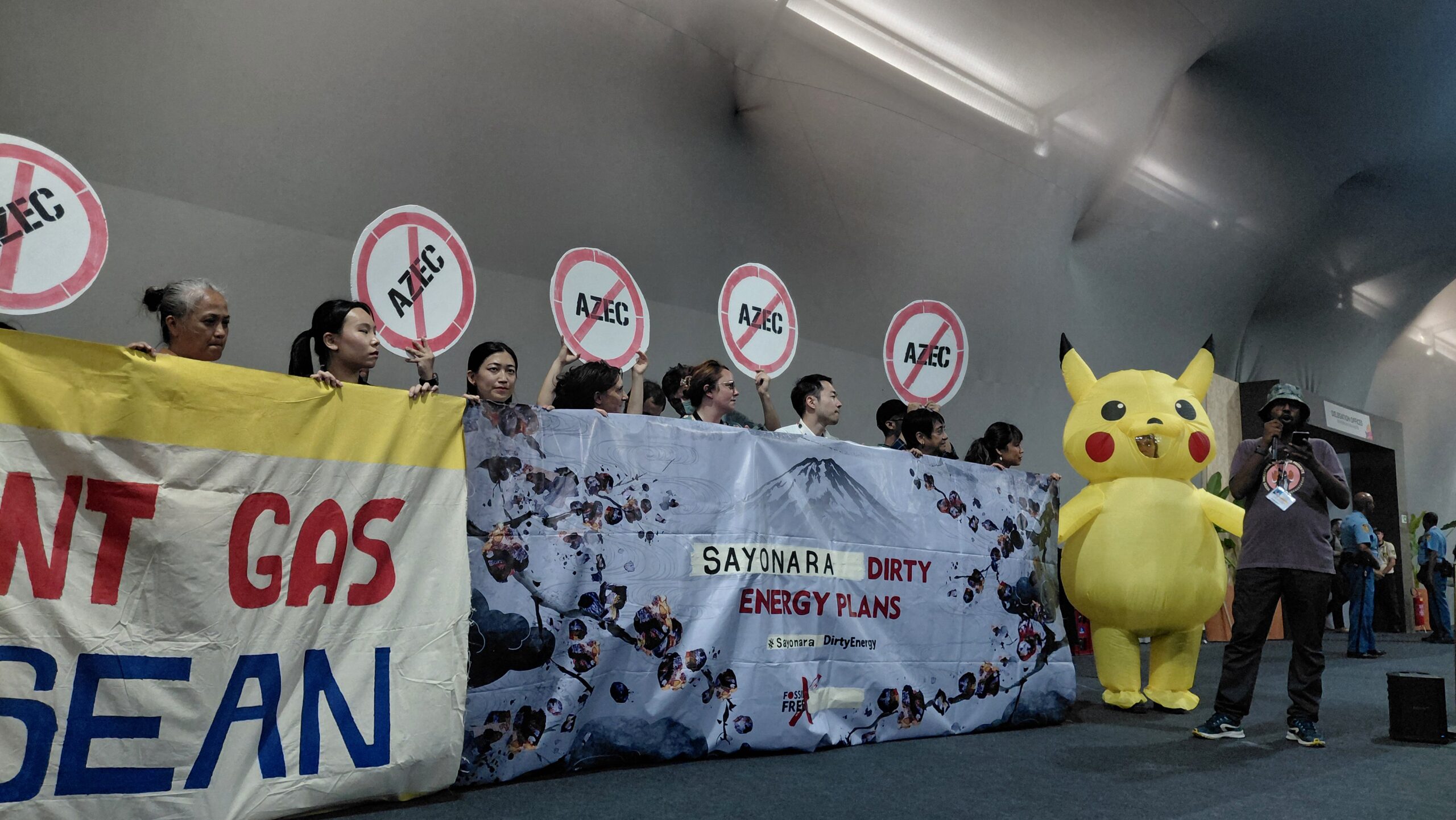At COP30, civil society demands Japan stop bankrolling fossil fuels and drop AZEC’s “false solutions”

Giant Pikachu action, toxic tour for the media, and frontline voices spotlight Japan’s fossil finance and associated harm across the Global South.
FOR IMMEDIATE RELEASE
Belém, Brazil — November 14, 2025 — On COP30’s Energy Day, a coalition of Asian and Global South groups staged two eye-catching actions calling on Japan to end all public finance for fossil fuels and to withdraw its promotion of biomass/ammonia/hydrogen co-firing and CCS under the Asia Zero Emissions Community (AZEC), actions which lock countries into dependence on fossil fuels. The afternoon photo action features inflatable Pikachu suits and banners that read “Stop Fossil Fuel Expansion and False Solutions!”, while the afternoon “toxic tour” guides journalists through Asian country pavilions to show how Japan exports its fossil agenda under the name of “decarbonizing Asia.”
Like the Belém 4x Pledge on Sustainable Fuels — of which Japan is one of three sponsoring countries — the Japan-led regional initiative AZEC (Asia Zero Emission Community) also promotes false solutions. Expensive fossil fuel–based technologies, including LNG, biomass, hydrogen and ammonia co-firing, and CCS, are being pushed through numerous Memorandums of Understanding and by supporting the development and revision of some Asian countries’ energy plans. At COP30 and under AZEC, Japan seeks to promote these false solutions that prolong fossil dependence.
These efforts are part of Japan’s broader strategy to maintain fossil-fuel infrastructure worldwide. Since 2016 — the year the Paris Agreement took effect — JBIC, Japan’s export credit agency, has provided direct financial support to 26 fossil-gas projects in 15 countries. The consequences are severe: a recent study found that JBIC-attributable emissions in 2024 reached 408 million tons CO₂-equivalent, comparable to the world’s 20th-largest national emitter.
Another severe consequence is significant social and environmental harm to communities on the ground. At the afternoon action, speakers from the Philippines, Malaysia and Australia highlighted how Japanese-backed gas expansion endangers marine biodiversity and livelihoods—for example, at the Ilijan LNG terminal near the Verde Island Passage, a global marine biodiversity hotspot.
The action amplified communities’ demands worldwide: end Japanese public support for fossil fuels, stop false solutions, and contribute climate finance for a just transition.
Action Photos are available HERE.
Quotes
Amalen Sathananthar, Asian Coordinator, The Artivist Network
“Malaysia and other Southeast Asian countries and South Asian countries have huge renewable potential, especially solar. But Japan is using AZEC to push technologies that will prolong the use of gas and coal. Malaysia’s leadership should not lend legitimacy to Japan’s dirty energy strategy. Instead, it should champion affordable , accessible renewable energy and could become a sovereign energy power in the region..”
Lidy Nacpil, Coordinator, Asian Peoples’ Movement on Debt and Development
“As the world’s third largest economy, Japan has the power and capacity to lead the global phaseout of fossil fuels, yet it continues to fund the expansion of dirty energy in Asia. Japan’s financial support for fossil fuels in Southeast Asia has destroyed both marine biodiversity and the livelihoods of our fisherfolk. At COP30, global civil society must pressure Japan into pivoting its financial support away from fossil fuels and lead Asia’s transition to renewable energy.”
Sharif Jamil, Coordinator, Waterkeepers Bangladesh
“As the world comes dangerously close to failing the goals of the Paris Agreement, it has never been more urgent for rich countries to lead the transition away from fossil fuels. Yet Japan continues to pour hundreds of billions into fossil fuels and ineffective carbon capture technology. Japan must redirect its fossil fuel finance, both public and private, and fund a fast and fair energy transition.”
Masayoshi Iyoda, Campaigner, 350.org Japan
“The absence of PM Takaichi at COP30 sent a worrying message that Japan is not ready to dislodge itself as one of the world’s top fossil fuel investors. Instead of being a champion of renewable energy, it is proving itself a champion of false climate solutions, such as fossil gas, ammonia co-firing with coal, CCUS, and nuclear. Now at COP30, it has joined a pledge to quadruple ‘sustainable fuels,’ mostly biofuels and biomass that are linked to deforestation and food insecurity. There is still time to course correct. We demand that Japan not contribute to further climate pollution and instead pay for what it has historically caused. Communities across the globe suffering from Japan’s fossil fuel investments have drawn the line. If it is to earn legitimacy, the new government must not cross it.”
Hiroki Osada, Campaigner, FoE Japan
“A Japan-focused protest at COP30 makes clear the Global South’s deep concern over Japan’s decarbonization strategy. Community testimony from project sites exposes the social and environmental harms of exporting fossil-based technologies to keep only a handful of Japanese companies happy.”
Aryanne De Ocampo, Campaigns Head, Center for Energy, Ecology, and Development / Protect VIP
“Through JBIC, Japan bankrolled the Philippines’ first LNG facility — one that lies at the heart of the biodiverse Verde Island Passage, our Amazon of the oceans. Japan also continues to fuel coal and gas expansion throughout Southeast Asia, even as our people already have one foot in the grave from our extreme vulnerability to climate disasters. Fisherfolk, communities, and civic movements in the Philippines and Southeast Asia reject Japan’s insistence on dirty and deadly fossil fuels. We will not let Japan hinder an urgent and just transition to renewables in our region.”